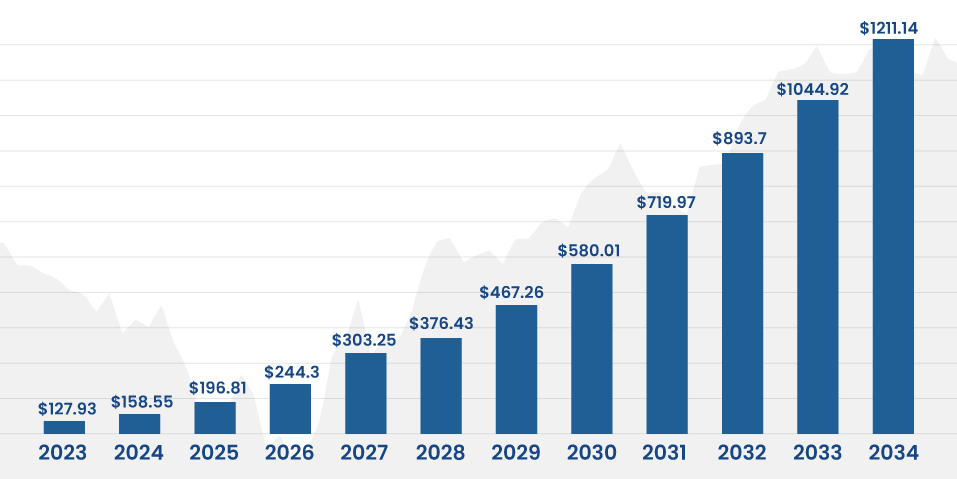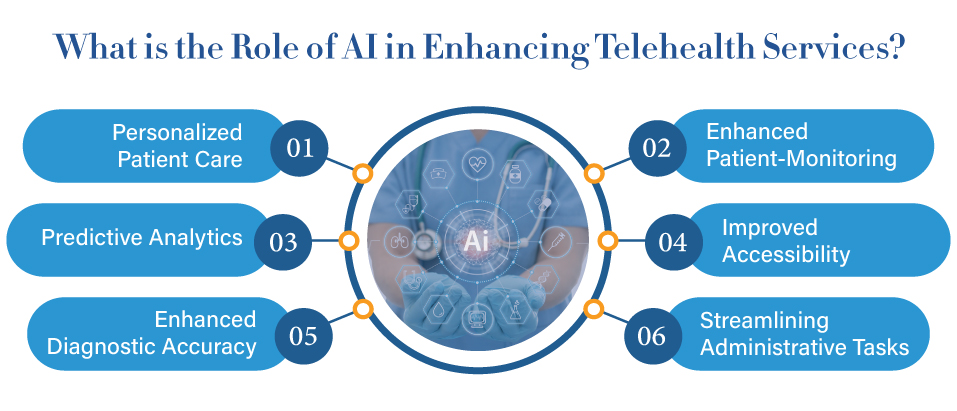Artificial Intelligence is revolutionizing various industries. One such big sector is AI in telehealth, where technology has changed the way medical services are delivered and is moving towards digitalization. This rapid shift towards digitalization in healthcare was seen especially in COVID-19, but after that, Telehealth became an integral part of modern healthcare.
As artificial intelligence (AI) continues to grow, the advancement of Telehealth is also growing further. From online consultations to easy records accessibility and in-depth reports to scheduling appointments, healthcare has grown a lot in recent years with AI, and still, it’s just a starting.
So, if you are curious about healthcare transformation and how AI is making a huge impact, keep reading.
In this article, we will explore telehealth, the role of AI in telehealth, its benefits, use cases, challenges to be resolved, and its future scope.
So, without any further delay, let’s dive in!
Telehealth: Overview
Telehealth is one of the fastest-growing sectors, especially after COVID. It has completely revolutionized compared to traditional health care services, which started from basic phone calls with doctors to now advanced remote medical services to patients.
Did you know that over 97% of healthcare professionals adopted telemedicine in their practices during COVID-19? The telehealth market is now expected to reach $1,211.14 billion by 2034, with a CAGR of 22.5%.

Initially, Telehealth was used in special places where medical services were hard to reach, such as rural or underserved areas. Where simple phone calls are offered by doctors for medical advice, Telehealth for clinics and hospitals becomes an integrated palace, especially for those areas where medical services are hard to reach.
After digitalization, when rural areas also have fast internet and smartphones, telehealth has become much more essential, allowing them to consult with specialists without worrying about going anywhere for an appointment.
When COVID hit, Telehealth received huge attention and became the only healthcare for patients and doctors to connect virtually. It allows patients to connect with specialists and get the consultant at home without going anywhere or waiting in a long queue. Plus, it allows professionals to care more conveniently. Thanks to technological advancement, it streamlines various healthcare operations, including patient intake, symptom checking, report generation, medication reminders, and much more.
Even after COVID, telehealth continues to grow and become a preferred option for patients and professionals to receive medical services remotely. Now, most medical services are delivered remotely, reshaping the healthcare sector.
What is the Role of AI in Enhancing Telehealth Services?

Artificial Intelligence is reshaping the telehealth sector with its technological advancements, making the adoption of Telehealth much faster and improving telehealth efficiency. Let’s understand how AI is making a significant impact in Telehealth:
1. Personalized Patient Care
One of AI’s most significant impacts on Telehealth is providing personalized care to patients. AI has outstanding capability to analyze data and provide valuable insights. These valuable insights about patients help doctors make better decisions and provide personalized care. Plus, AI can customize diet and fitness plans according to patients’ health conditions to optimize treatment effectiveness.
2. Enhanced Patient-Monitoring
There are various wearable and home-based devices available that can help AI collect data, such as blood pressure, heart rate, glucose levels, etc., about the patients and monitor their health condition and progress in real-time. These data and insights help AI identify overall lifestyle and ensure it provides alerts before an issue becomes serious. The combination of AI and gadgets allows us to track real-time patients’ health and manage chronic conditions like diabetes or heart disease before any critical situation.
3. Predictive Analytics
This is one of the best cases of AI being used for predictive analytics in healthcare. This means that AI can use patients’ real-time data to predict potential health issues and early signs before the issue becomes serious. It helps doctors and patients stay alert and take steps before making critical decisions.
4. Improved Accessibility
Another revolutionary change AI has made is to overcome the geographical barrier and make healthcare service available for everyone in the world remotely, including rural and underserved areas. Also, AI-driven chatbots are also helping patients book their appointments, resolve queries, provide health tips, and provide 24/7 support.
5. Enhanced Diagnostic Accuracy
AI algorithms are advanced enough to analyze medical data such as lab results, images, and patient health data to assist doctors in accurately diagnosing diseases. For example, AI can analyze X-rays or MRI scans faster and better and diagnose conditions like cancer or fractures faster and better. This helps doctors obtain further assistance and make the best decisions for patient care.
6. Streamlining Administrative Tasks
When offering medical services remotely, various operations need to be handled, such as billing, booking appointments, follow-ups, medication reminders, etc. Amazingly, AI helps to streamline all these operations and make telehealth operations more efficient.
Top 5 Benefits of AI in Telehealth
Here are some key benefits of AI in Telehealth:
1. Improves Healthcare Accessibility
One of the biggest benefits of AI in Telehealth services is improving its accessibility and efficiency. Medical services are now available remotely across the globe, including in rural and underserved areas. Patients don’t need to go anywhere to meet with a specialist. They can have an online consultation, and professionals can utilize AI for proper diagnosis and personalized patient care.
2. Cost Efficient
Healthcare organizations find the AI-powered telehealth system more cost-effective because it can automate most of the operations, including booking appointments, prescriptions, billing, records, check-ins, etc. This saves the time and cost of manual work and makes the operations more cost-efficient than in-person visits. This way, healthcare organizations save their resources to utilize technology and spend less on minor employees to do the work.
3. Better Patient Engagement and Satisfaction
AI in telehealth’s main aim is to analyze the patient’s data and predict possible health issues and symptoms. This helps doctors and professionals stay alert and provide personalized care to resolve health issues before they become critical. Overall, it improves patient satisfaction and overall health.
4. Excellent Support with AI-powered Chatbots
Chatbots are playing a crucial role in the telehealth sector. Nowadays, most healthcare organizations are placing AI-powered chatbots on their websites. These AI-powered chatbots help patients resolve their queries, book appointments, ask for medical advice, and access appropriate care, which overall helps them access medical services remotely without getting stuck anywhere.
5. Data-driven Decision Making
Healthcare professionals and doctors have seen significant improvement in their decision-making after using AI. Now, they’re using AI to analyze patients’ health records and provide useful insights, which help them make better decisions for patient care and diagnose more accurately, which overall improves patients’ health.
Challenges and Ethical Considerations in Telehealth
Here are some common challenges and ethical considerations in Telehealth:
1. Technology Availability Issues
One of the biggest challenges in the adoption of Telehealth is technical availability. Various rural areas and underserved areas lack the internet accessibility of smartphones to use telehealth services. As a result, these patients miss out on healthcare services remotely. This is one of the key challenges that requires attention for digitalization and improving well-being.
2. Accuracy Concerns
Relying on AI can be a big concern because AI works on algorithms and completely depends on data to produce output. If the quality of data is not accurate or well-defined, then there’s a chance that AI will produce different outcomes, which can affect the accuracy of diagnosis and patient care. This is especially true in telehealth cases where all the records are virtual, and AI will analyze the data to produce an outcome. That’s another common challenge healthcare professionals face when using AI for diagnosis.
3. Privacy and Data Security
As digitization grows rapidly, the chances of data breaches and cyber threats also become a major issue. So, it’s essential for healthcare organizations to protect their patients’ sensitive data from unauthorized access and hacking. If the telehealth app is not secure enough, it can lead to data breaches and major losses.
4. Regulatory Compliance
Telehealth is an advanced technology that requires complex rules and regulations to be followed. Different states have different laws for implementing telehealth practices, and healthcare organizations need to understand and ensure regulatory compliance.
5. Inadequate Training
Another big challenge I face while using Telehealth by healthcare organizations is inadequate training. Healthcare providers must receive training to use this platform efficiently. Otherwise, many complications can arise while using this platform and bad patient care. So, giving adequate training for telehealth platforms is essential for healthcare providers and patients.
The Future of Telehealth
Overall, AI has already made a significant impact in telehealth, but it’s still just a start, and there’s a lot more to explore and involve over time. Telehealth is here to stay and making healthcare services accessible across the globe. As AI grows, patient care will become much better. Now, AI has become a fundamental part of the healthcare sector.
Conclusion
The future of telehealth is bright. It is becoming more accessible, efficient, and a preferred option for patients who want remote medical services in the comfort of their homes. Plus, it allows healthcare professionals and doctors to diagnose patients more accurately and efficiently. We hope this guide will help you learn everything about Telehealth, the role of AI in Telehealth, its benefits, challenges, and the future of Telehealth.
So, if you’re a healthcare organization planning to adapt to telehealth platforms, i-medicus telehealth services can help your organization adapt to the telehealth facility and offer remote health services more efficiently. Contact us today and see how you can adapt effortlessly to Telehealth.
FAQs
Q1. How does AI improve telehealth?
AI in Telehealth is mainly used to analyze the patient’s data and find potential symptoms, health issues, or valuable insights that can help doctors make better diagnoses and give better patient care. AI also helps automate various administrative tasks, including booking appointments and billing.
Q2. Is it worthwhile to invest in AI integration for telehealth software?
Absolutely Yes, AI integration with Telehealth increases the capabilities and functionalities such as better decision-making, personalized patient care, streamlining operations, and reducing costs. AI enhances telehealth’s efficiency, leading to better patient care overall.
Q3. Can AI predict health problems?
Yes, AI can analyze real-time patient data to identify patterns and identify early symptoms and signs of health issues. This helps doctors take better care and resolve the problem before it becomes critical. However, prediction accuracy depends on the quality of data provided by AI.








